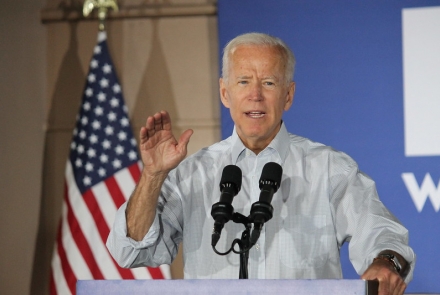
Photo by Matt Johnson on Flickr
Pacific pivot or pirouette?
Whilst the Biden administration has signalled its intent to more actively engage the Pacific Islands region, it is yet to be seen if this is just a flash in the pan, Meg Keen writes.
When United States President Joe Biden was elected, Pacific Island expectations were high — and so were the stakes. Yet the Pacific Islands are used to promises and pledges that at times turn into pirouettes – nicely executed moves that don’t actually take you too far.
Nearly 100 days after his inauguration, have Biden’s policies matched the early wave of Pacific optimism? And what should be next on the American agenda?
Under Biden’s predecessor President Donald Trump, the United States withdrew from the Paris Agreement, threatened to leave the World Health Organization (WHO), and viewed the region mainly through a China threat lens.
Throughout the 2020 American election campaign, two key policy differences of importance to the Pacific Island region separated Biden from Trump. The first was Biden’s ambitious climate agenda and the second was his commitment to multilateralism.
After a relatively short time in office, it’s a little early to judge Biden’s performance, but we can look at momentum.
On climate, Biden re-joined the Paris Climate Agreement just hours after taking office. His call for ambitious climate action has restored American global climate leadership. His words reflected Pacific sentiments: “We need to take drastic action… how we act or fail to act in the next 12 years will determine the very liveability of our planet.”
In April 2021, the Biden-initiated Leaders’ Summit on Climate pushed high emitting countries to make ambitious national pledges. He committed the United States to a 50-52 per cent carbon emissions reduction by 2030 compared to 2005 levels and to achieve net-zero emissions no later than 2050. Japan, European Union, Canada, and United Kingdom followed with ambitious targets. It’s commendable, but much more is needed to avert the Intergovernmental Panel on Climate Change’s predictions of climate catastrophes.
The United States’ climate finance plan will assist developing countries to protect ecosystems, build climate resilience, and secure climate-aligned investments. This augments Special Envoy for Climate John Kerry’s renewed support for the Green Climate Fund (GCF), including a request to Congress for US$1.25 billion for GCF this budget cycle.
These are positive first steps, aligned with Pacific interests. The next test will be American leadership and performance at the 2021 United Nations Climate Change Conference in November.
On multilateralism, the Biden administration has committed the United States to key forums including the WHO and COVID-19 Vaccines Global Access (COVAX). Papua New Guinea (PNG), with at least 10,000 COVID-19 cases and climbing, is benefiting from 132,000 COVAX supplied vaccines in the last fortnight, but a collective effort is needed to address the crisis across the country, with all provinces having now recorded cases.
The United States initiative, Operation Warp Speed, is also rolling out vaccines to protect Micronesian states, with some tiny Pacific nations set to be the first to be fully vaccinated.
‘Mini-multilateralism’ groups involving the United States are also delivering. Members of the Quadrilateral Security Dialogue (the Quad) — which includes the United States, Australia, India and Japan — are pooling resources to distribute US$1 billion worth of COVID-19 vaccines to the Indo-Pacific. It’s overt vaccine diplomacy, but in the Pacific’s desperate bid to get their fair share of vaccines, they’ll take whatever they can get — as well as what China has to offer.
The recent expansion of the Quad agenda from maritime security to human security and humanitarian issues related to supply chains, public health, and disaster response is welcome and consistent with the Pacific’s expanded concept of security.
Still, the Quad’s core focus remains deterring Chinese influence, which sits uneasily in a region that wants to be “friends to all”. More collaboration across the political spectrum would likely be appreciated to reduce the strain of donor competition on small bureaucracies.
The United States could do much more to display its commitment around the region. The recent Biden government announcement of the Small and Less Populous Island Economies (SALPIE) Initiative is a nice first step, though it is unclear if it will add to Trump’s US$100 million Pacific Pledge or just re-package it.
The United States is selling the SALPIE initiative as a strong commitment to small island state “sustainable development, climate change, economic growth and capacity building”. Realistically though, like the Pacific Pledge, it is largely motivated by worries over Chinese ascendency and “countering predatory investment practices by malign actors”.
Domestically, there are moves to affirm that Pacific Island lives and livelihoods matter in American policy. In March, Biden included Pacific Islanders in a package to provide US$50 million in COVID-19 relief funds for community programs and a COVID-19 equity taskforce. With US-based Pacific communities reeling from the disproportionate impact of the pandemic, this is a welcome gesture. Equally welcome was the commitment to expand healthcare and restore Medicaid for Marshall Islanders, Palauans, and Micronesians, which recently passed Congress.
Health security could use more attention too. With health systems in the region largely focused on the COVID-19 crisis, other pressing health challenges are going under the radar. Notably, non-communicable diseases account for around 70-75 per cent of all deaths.
Rapid resource degradation from climate change and exploitation is also undermining sustainable development. A well-coordinated donor consortium, including the United States, could make a big difference to health, human, and resource security.
Geopolitical competition among the great powers will persist and be a strong driver of regional engagement. But to win Pacific hearts and minds, the United States needs to demonstrate enduring commitment and an ability to engage in coalitions of Americans and Pacific Island people, with a heightened emphasis on local human security beyond a military focus.
Commitment would also be more convincing with additional diplomatic posts in the region and USAID extended overtly across the region.
After Biden’s first 100 days, there is good momentum — but the region will be watching throughout his term in the hope that the positive Pacific pivot doesn’t turn into another pirouette.
Updated: 21 July 2024/Responsible Officer: Crawford Engagement/Page Contact: CAP Web Team












